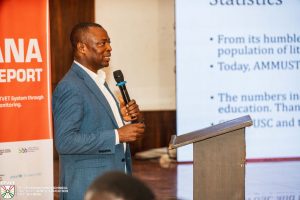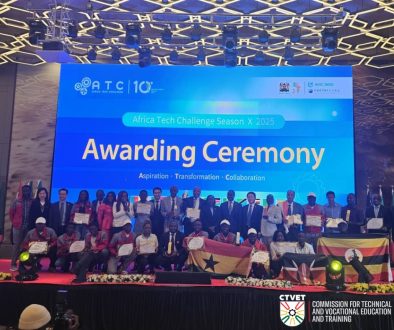Ghana’s TVET Workshop Charts New Path for Evidence-Driven Skills Development
Accra, Ghana – Ghana has launched an ambitious effort to transform its Technical and Vocational Education and Training (TVET) sector by strengthening its data systems, in what officials and experts describe as a decisive step toward equipping young people with the skills demanded by a rapidly evolving labour market.
Over two days in Accra, government officials, academics, industry leaders, and development partners converged for a high-level workshop under the theme “Strengthening Ghana’s TVET System through Evidence-Based Data Monitoring.” The gathering was marked by candid reflections, global insights, and practical strategies, all aimed at building a transparent and reliable TVET data ecosystem.
Data as the Foundation of Reform
Opening the event, Mr. Kevin Antierku, Deputy Director for the TVET Directorate at the Ministry of Education, stressed that accurate data was the “heart of Ghana’s development agenda.” Without it, he cautioned, “we risk misallocating resources and missing opportunities to harness the full potential of TVET for socio-economic development.”
That sentiment was echoed by Mr. Anthony Seyram Kwame Zu, Deputy Director General of the Commission for Technical and Vocational Education and Training (CTVET). Speaking on behalf of Director General Zakaria Sulemana, Zu described reliable data as “the bedrock of planning, monitoring, and accountability,” particularly for assessing whether training programs align with labour market needs.
For Christin Lucille McConnell, Chief of Education at UNICEF Ghana, the debate was not only about efficiency but also about equity. “Data is not only a technical instrument; it is a foundation for equity, accountability, and efficiency,” she told participants, calling for evidence-based policies that reflect the aspirations of young people.
International partners also weighed in. Julia Olesen, Senior Technical Advisor at Germany’s Federal Institute for Vocational Education and Training (BIBB), underscored how standardized and transparent reporting in Germany has become central to shaping effective skills policies. Her message was clear: Ghana could adapt lessons from global best practices to design its own robust systems.
From High-Level Reflections to Practical Pathways
If Day One set the tone with sweeping speeches and expert panels, Day Two dug into the mechanics of reform. Olesen returned with a detailed presentation on Germany’s data reporting framework, offering a case study of how strong systems underpin policymaking and labour market responsiveness.
Participants then split into working groups to tackle four priority areas:
TVET MIS & Infrastructure: Strengthening digital platforms to ensure accurate and consistent reporting.
Data Acquisition & Quality Assurance: Building standardized mechanisms to improve data reliability.
Indicators for Policymaking: Identifying metrics that matter most for aligning training with economic needs.
Communication & Processes: Streamlining how data is shared across institutions to reduce duplication and improve collaboration.
The sessions generated practical recommendations—from expanding datasets on informal apprenticeships and graduate tracer studies to capturing private sector contributions to skills development.
Confronting the Challenges
Despite the optimism, officials acknowledged persistent hurdles. In his closing remarks, Zu described data as “the lifeblood of modern policymaking” but warned that Ghana’s TVET landscape remains fragmented. Multiple actors currently collect information in different formats, leading to inefficiencies and underutilization of existing data.
He pointed to critical gaps in areas such as informal training, graduate outcomes, and private sector involvement. “Addressing these gaps will be essential for building a TVET sector that is responsive, efficient, and future-ready,” he said.
A Collective Agenda
Beyond government officials, the workshop drew a wide spectrum of stakeholders: development partners including GIZ, ILO, UNESCO, UNICEF, and VIS; the Ghana Statistical Service; NDPC; trade associations; academia; and industry representatives. Their involvement underscored the multi-sectoral nature of TVET and the recognition that skills development is central to Ghana’s economic ambitions.
Panelists such as Dr. Stella Asare of the TVET Service, Mr. Edward Dogbey of the Ministry of Education, and Dr. Martin Amoamah of Accra Technical University debated how consistent reporting could strengthen collaboration and accountability. Universities and technical institutions, meanwhile, showcased research on emerging TVET trends, while the Ghana Education Service highlighted tools such as the Mobile School Report Card and Education Management Information System.
The conversations revealed both urgency and opportunity. Scarcity of reliable data, participants agreed, poses a significant risk to effective policymaking. But the commitment displayed by government, academia, and development partners suggested a readiness to move from aspiration to implementation.
Looking Ahead
As the workshop concluded, there was broad consensus that data is not merely about numbers—it is about people, opportunity, and national competitiveness. Stakeholders left aligned around a vision of building a comprehensive and sustainable TVET data ecosystem, one capable of guiding Ghana’s transition to a skills-driven economy.
“Data serves as the compass that guides policy direction,” Zu told participants. With Ghana’s workforce facing the twin pressures of technological disruption and shifting labour market demands, that compass may prove indispensable.
The challenge now is turning the insights of the workshop into concrete reforms. If achieved, Ghana’s TVET sector could become a model for how data-driven education systems fuel socio-economic transformation in Africa.






















